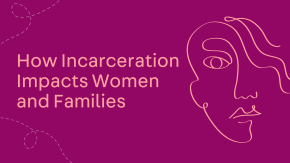
Violence and inhumane conditions are synonymous with the jails on Rikers Island, but to get a full picture of the harms we must also look at the impact on women and families.
The routine violence and inhumane conditions that have become synonymous with the jails on Rikers Island are well documented but to get a full picture of the harms we must also look at the impact on women and families.
Last week’s call by 15 New York City Councilmembers to reduce the number of women incarcerated in city jails underscores how women and gender-expansive people on Rikers Island are uniquely vulnerable. Seventy percent are caregivers, cut off from their children and families, and many are victims of domestic violence. While incarcerated, they face an increased risk of sexual abuse and re-traumatization, a fact highlighted by the over 700 lawsuits filed by women alleging a “breathtaking scope” of abuse on Rikers.
The conditions these women experience remind me that all women connected to Rikers face increased stress and potential for harm. This includes the many thousands of women caring for kids and maintaining households while their husbands, boyfriends, brothers, sons or grandsons are in jail, and the thousands of female correction officers managing high-stress jobs while, in many cases, serving as single parents and family caretakers.
All these women—detainees, family members, and staff—are disproportionately from communities of color, where histories of systemic bias and disinvestment have imposed greater stresses and responsibilities as family and community caretakers.
When a mother loses the father of their child to incarceration the burdens on them increase: they must care for their children plus support the incarcerated family member with visits, calls, money, and more. Meanwhile, their children may need counseling and extra supports to help deal with the trauma of having a parent behind bars. Mothers and grandmothers are often the ones who bring children on visits to Rikers, navigating long travel times, invasive screenings, and deplorable visiting rooms.
Correction officers experience their own stresses, with rates of post-traumatic stress disorder as high as 27 percent. Studies have also found higher rates of depression, work-home conflict, burnout, decreased life satisfaction and suicide among correction professionals. On top of that, female correction officers face the extra burden of childcare responsibilities—a fact particularly relevant in New York City, where 44 percent of correction officers (and 58 percent of uniformed supervisors and captains) are women, far higher than the national average of 28 percent. And female correction officers are more likely to be the sole or primary caretaker of their children.
In a recent survey of 326 uniformed parents (nearly 70 percent of them mothers) employed by the NYC Department of Correction, 92 percent had primary responsibility for their kids. In addition, the city’s jail workforce is 63 percent Black and 22 percent Hispanic, and we know that Black and Hispanic women are far more likely than white women to be the primary economic support for their families.
The challenges of parents everywhere—finding childcare, dealing with unexpected emergencies, having the emotional resources after a day of work to meet their children’s needs with nurturing and patience—are amplified for women working for the Department of Correction. During their shifts, they can't use cell phones, e-mail or any form of communication with the outside. This is true even in the event of a last-minute shift change, when officers have no way to reach their child’s daycare center or babysitter.
The experiences of the 386 women incarcerated on Rikers, the 3,100 plus women who work in uniform, and the thousands of mothers, grandmothers, partners, sisters, and daughters who are holding families together underscore the urgent need for the city to fulfill its commitment to close Rikers.
Planning for fewer jail beds for women—and all genders—along with more investments in social services and other supports to build stable and healthy communities is the right thing to do. But as the city moves forward with its plan to close Rikers, let’s not also forget that the trauma of Rikers doesn’t stay there but also ripples through the lives of staff and the families and communities of those detained there, inflicting needless pain and lasting damage until Rikers is shuttered once and for all.

